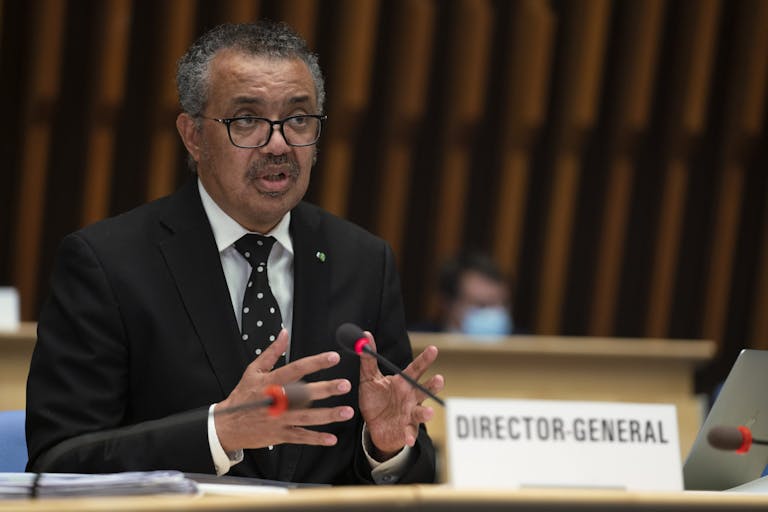How do we address the governance gaps exposed by COVID-19?
The COVID-19 pandemic has illuminated significant gaps in the collective capacities of the world to prepare for, prevent, and respond to future health threats. Could warning bells have been triggered louder and earlier? Could we have a better system to allocate new vaccines and other precious countermeasures more equitably? Could there be better and faster ways to marshal resources — scientific, financial, human — to respond if a threat starts to boil up?
Governments and various independent review panels around the world have come up with their own ideas to address the gaps of existing pandemic preparedness and response efforts, and the World Health Organization (WHO) has already designed some new innovations, such as the Hub for Pandemic and Epidemic Intelligence and BioHub.
One idea that gained traction in the spring of 2021 was the idea of an overarching convention, or treaty, that could codify — through an intergovernmental process — a shared set of principles, norms, regulations, rules, and responsibilities for how the global community should operate in the context of a threat that knows no borders. Proponents of a treaty argue it could be a way to elevate attention to future global health threats to the highest levels of political leadership and foster whole-of-society and whole-of-government approaches; align the global community on how to equitably allocate precious and potentially sparse countermeasures — new vaccines or treatments, even personal protective equipment — that might otherwise be hoarded; strengthen responsibilities, incentives, and enforcement around data sharing; and create the means for independent monitoring or verification of compliance.

In March, leaders of two dozen countries, together with the WHO Director-General, Dr. Tedros Adhanom Ghebreyesus, noted that “such a renewed collective commitment would be a milestone in stepping up pandemic preparedness at the highest political level.”
Setting the Stage for a WHA Special Session
During the annual meeting of the World Health Assembly in May, the Assembly agreed to convene a Special Session of the World Health Assembly in November 2021. It also agreed that the Special Session would focus on only one agenda item: consideration of the benefit of developing a new international legal instrument on pandemic preparedness and response.
To prepare for this WHA Special Session, the Working Group on Strengthening WHO Preparedness and Response to Health Emergencies (WGPR) was created in May 2021, open to all Member States. Since May, the WGPR’s has explored and debated the possibility of a new and potential international instrument, like a treaty, for further discussion at the Special Session.

Throughout the WGPR’s meetings, consensus was not reached on the exact vehicle for the new instrument (whether a treaty, convention, regulation, or otherwise), but delegations made it abundantly clear that improvements need to be fully explored to strengthen collective capacities to prepare for and respond to future health threats and that WHO’s role as the global coordinating authority on health was vital. With the lessons of the COVID-19 pandemic fresh on their minds, Member States and WHO are carefully considering how to fully seize the opportunity of this moment in history and ensure that all nations have the capacity to prevent and respond to future health threats.
The Way Forward
It is not yet clear whether there is sufficient political will among Member States to move quickly through a negotiating period on a new treaty. Some even contend that a new treaty isn’t needed, or useful, and that energies would be better placed strengthening existing agreements, such as the International Health Regulations (IHR) which was last revised in 2005 and put into force in 2007. The IHR (2005) was developed after an outbreak of SARS (severe acute respiratory syndrome) in 2003. It outlines the legally binding duties of all 196 participating countries to detect, access, report, and respond to public health threats.
The weeks and months following the Special Session will be filled with debate regarding the nature, scope, and feasibility of the decisions made during the Assembly, and their implications for future governance of pandemics and global health more broadly. How those negotiations unfold will have lasting implications for WHO’s position in the governance of future pandemics and health threats and serve as a test of the willingness of leaders to invest in collective solutions. There is a long road ahead, but discussions that are about to start show a willingness by Member States to strengthen the world’s ability to work together to keep us all safer and healthier. Will the world be better prepared for a future health threat? Better global cooperation on health would undoubtedly help. Will a new pandemic treaty be the way that the world rallies to do that? The answer is far from certain.


